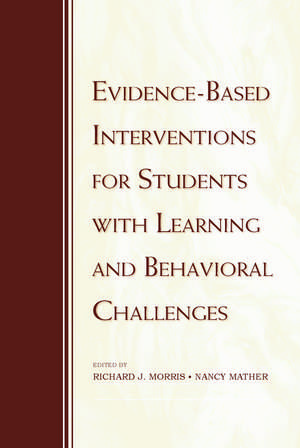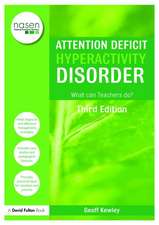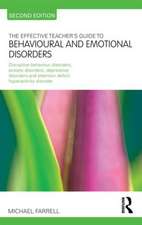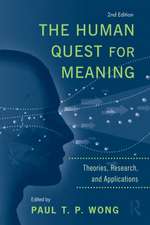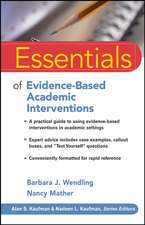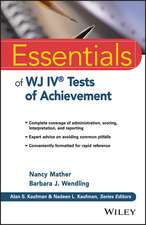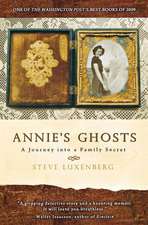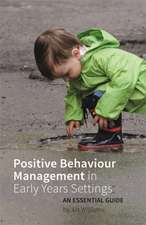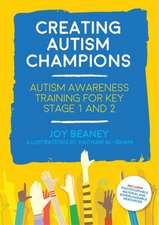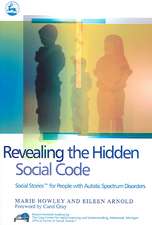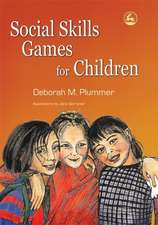Evidence-Based Interventions for Students with Learning and Behavioral Challenges
Editat de Richard J. Morris, Nancy Matheren Limba Engleză Paperback – 19 noi 2007
| Toate formatele și edițiile | Preț | Express |
|---|---|---|
| Paperback (1) | 794.86 lei 6-8 săpt. | |
| Taylor & Francis – 19 noi 2007 | 794.86 lei 6-8 săpt. | |
| Hardback (1) | 1343.56 lei 6-8 săpt. | |
| Taylor & Francis – 29 noi 2007 | 1343.56 lei 6-8 săpt. |
Preț: 794.86 lei
Preț vechi: 969.34 lei
-18% Nou
Puncte Express: 1192
Preț estimativ în valută:
152.09€ • 159.23$ • 125.85£
152.09€ • 159.23$ • 125.85£
Carte tipărită la comandă
Livrare economică 07-21 aprilie
Preluare comenzi: 021 569.72.76
Specificații
ISBN-13: 9780415964555
ISBN-10: 0415964555
Pagini: 436
Ilustrații: 25 tables
Dimensiuni: 178 x 254 x 23 mm
Greutate: 0.81 kg
Ediția:1
Editura: Taylor & Francis
Colecția Routledge
Locul publicării:Oxford, United Kingdom
ISBN-10: 0415964555
Pagini: 436
Ilustrații: 25 tables
Dimensiuni: 178 x 254 x 23 mm
Greutate: 0.81 kg
Ediția:1
Editura: Taylor & Francis
Colecția Routledge
Locul publicării:Oxford, United Kingdom
Cuprins
Part I: Introduction. Morris, Mather, Introduction and Historical Perspectives. Braden, Shernoff, Why the Need for Evidence-Based Interventions? Part II: Students Having Behavioral Challenges. DuPaul, Rutherford, Hosterman, Attention-Deficit Hyperactivity Disorder. Liaupsin, Scott, Disruptive Behavior. Schoenfield, Morris, Childhood Fears and Related Anxieties. Reinemann, Schnoebelen, Depression and Related Difficulties. Part III: Students Having Learning Challenges. Fahey, Oral Language Problems. Mather, Urso, Teaching Younger Readers with Reading Difficulties. Wexler, Edmonds, Vaughn, Teaching Older Readers with Reading Difficulties. Berninger, Written Language During Early and Middle Childhood. Montague, van Garderen Mathematics Instruction. Dehn, Cognitive Processing Difficulties. Gildroy, Deshler, Strategies for Classroom Instruction. Gregg, Lindstrom, Accommodation of Instructional Testing Situations. Part IV: Issues Related to Teaching Students Having Learning and Behavioral Challenges. Ortiz, Issues Unique to English Language Learners. Pfeiffer, Blei, Serving Gifted Students with Learning and Behavioral Challenges. Kauffman, Mock, Tankersley, Landrum, Service Delivery Models. Part V: Commentary on Teaching Students Having Learning and Behavioral Challenges. Brooks, Goldstein, Perspective and Commentary: The Power of Mindsets, Creating Classrooms that Nurture Resilience.
Notă biografică
Richard J. Morris is the Meyerson Distinguished Professor of Disability and Rehabilitation and Professor and Director of the School Psychology Program in the Department of Special Education, Rehabilitation, and School Psychology at The University of Arizona. He has authored or edited 11 books and more than 100 journal articles and book chapters in the areas of special education and rehabilitation, child psychotherapy and child behavior disorders, and behavior modification.
Nancy Mather is Professor of Special Education in the Department of Special Education, Rehabilitation, and School Psychology at The University of Arizona. She specializes in the areas of assessment, reading, writing, and learning disabilities. She is a co-author of The Woodcock-Johnson III achievement test and has co-authored two books on interpretation and application of the WJ III. She has recently co-authored two books: one on intervention and management strategies for classroom teachers and another that deals with report writing.
Nancy Mather is Professor of Special Education in the Department of Special Education, Rehabilitation, and School Psychology at The University of Arizona. She specializes in the areas of assessment, reading, writing, and learning disabilities. She is a co-author of The Woodcock-Johnson III achievement test and has co-authored two books on interpretation and application of the WJ III. She has recently co-authored two books: one on intervention and management strategies for classroom teachers and another that deals with report writing.
Recenzii
Linda Mason (U. of Illinois) – "I agree that no such book exists as proposed by Drs. Morris and Mather and agree that there is a need for this volume. I generally found Drs. Morris and Mather’s book plan to be thorough and well developed. As noted, a more comprehensive review of academic interventions, especially for elementary-aged students, would strengthen the intervention section. Also, a major issue in the fields of learning disabilities and behavior disorders is the identification or often misidentification of students, and that issue should be included in the volume. In conclusion, I believe this book will make a unique contribution to the field of special education and I would most certainly purchase it for my personal use as well as use it in my own teaching. I recommend this book be developed for publication."
John Lloyd (U. of Virginia) – "I find the general structure of the proposed title sensible for the most part. Conceptualizing the map of issues, a tough task, requires a broad scope and a balance between topical and categorical approaches. The editors might want to consider sections on causes and on characteristics with chapters paralleling those in other sections. Such an addition would, of course, cause a frightening increase in the size of the book or require a reduction in the number of chapters in each section. I wonder why the two chapters in the Issues section were only two – nothing on identification, prevention, etc… The editors are well qualified, many of the proposed chapter authors are outstanding, and the emphasis on evidence-based practice quite welcome…. I suspect the market (beyond libraries) will primarily be professors and graduate students in advanced classes."
John Lloyd (U. of Virginia) – "I find the general structure of the proposed title sensible for the most part. Conceptualizing the map of issues, a tough task, requires a broad scope and a balance between topical and categorical approaches. The editors might want to consider sections on causes and on characteristics with chapters paralleling those in other sections. Such an addition would, of course, cause a frightening increase in the size of the book or require a reduction in the number of chapters in each section. I wonder why the two chapters in the Issues section were only two – nothing on identification, prevention, etc… The editors are well qualified, many of the proposed chapter authors are outstanding, and the emphasis on evidence-based practice quite welcome…. I suspect the market (beyond libraries) will primarily be professors and graduate students in advanced classes."
Descriere
This book assembles into one volume summaries of school-based intervention research that relates to those who deal on a regular basis with the growing body of students having high-incidence learning disabilities and/or behavior disorders: special educators, school psychologists, and clinical child psychologists.
